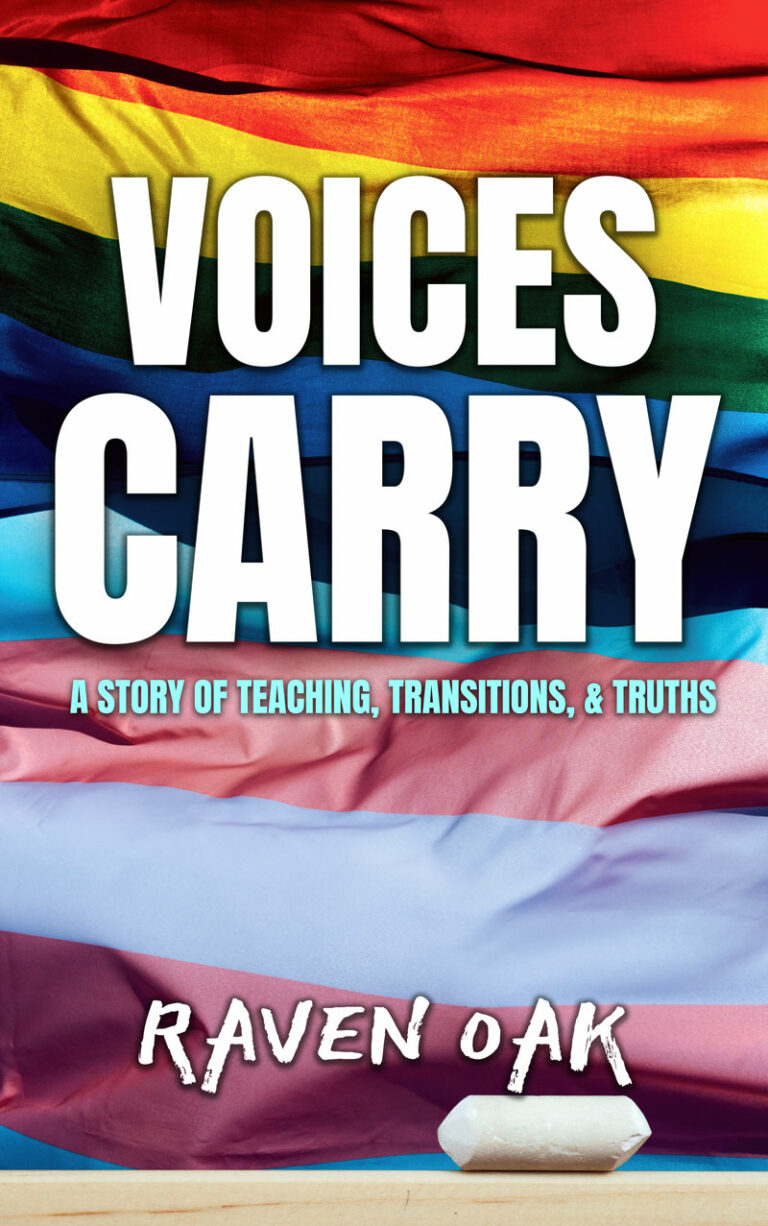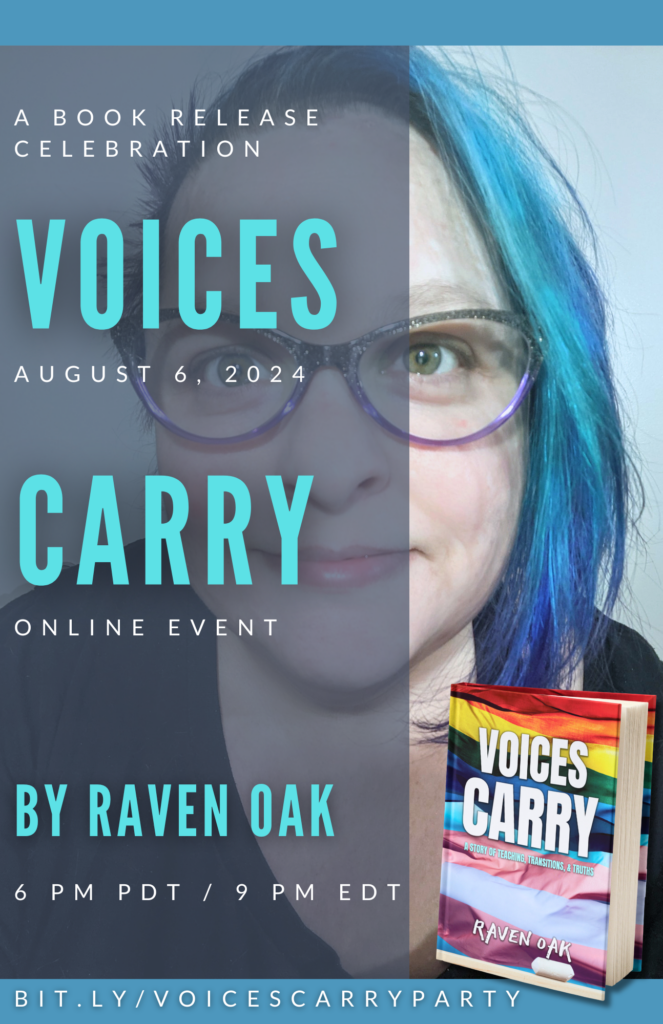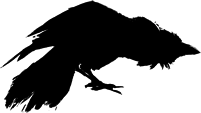My childhood was…different to put it mildly. Besides growing up in a religious, abusive household, my mother hopped in and out of my life—though only when she needed money[1]—leaving me confused about what it meant to be a young woman. All the questions one normally would ask their mother, remained silent on my tongue. Even if I’d had the courage to ask my father, doing so meant potential consequences.
Middle school is a time already fraught with chaos and angst as kids suffer through puberty and bullying. It’s challenging enough to face with a normal childhood and two parents, but for me, it was hell. Actually, it was worse than hell. I personally don’t believe in Satan, let alone heaven or hell, but if Satan existed, I think he would have taken one look at my teenage years and noped the fuck right out.
I suspect that’s why I chose to teach middle school. Deeply rooted in my being was the need to help students survive what was the second worst time of my life. Trying to convince your single father that puberty is an actual event occurring to you is rough, or at least it was for me. Despite teachers and nurses explaining to him that I needed to wear a bra as my overly large breasts were a distraction for everyone, he couldn’t admit that my body was changing, and I was no longer his little girl.
This began well before sixth grade, but when I began my period, he couldn’t avoid the topic any longer. It’s embarrassing enough for most teens to ask their mothers for period supplies or advice on cramps but asking your avoidance-loving father is an exercise in cruelty and shame. For a time, other friends’ mothers would take me bra shopping. I’d change into my bra on the school bus[2], attend school, and then take my bra off again during the bus ride home. On Fridays, my bras went home with a friend where they would be laundered and returned to me come Monday’s bus ride.
One day, I forgot to take off my bra.
When I walked into our apartment, I’d expected my father to be attending class. Instead, he sat on our ratty couch, surrounded by textbooks. His gaze shot to my chest.
“What are you wearing?” He was off the couch in an instant, and he slid aside my t-shirt’s collar.
I remained silent. He didn’t want an answer. He already knew it was a bra and answering would be seen as ‘talking back.’ What he wanted was for the moment to be undone.
“Go take it off. Don’t let me see you wearing it again.”
Ladies, gentlemen, and everyone else, I was twelve. I was wearing a C cup by necessity as I had inherited my mother’s ample chest. I’d been needing a bra since I was ten, but goodness forbid I be comfortable in my own skin.
That was a sin.
Goodness forbid I not be the butt of yet another joke. It would’ve been nice to not be grabbed and rubbed by pubescent boys who thought I was the best thing since sugar.
I’m sure that would’ve been a sin too, but to my father, it was my fault. Somehow, I was “encouraging” it and needed to pray harder.
Needless to say, puberty was a rough ride for me, full of secrets and hiding and wishing with every ounce of my being that I had a mother.
What further complicated these years was the experience of figuring out who I was as a person in terms of attraction, crushes, and gender. My upbringing meant that I never knowingly encountered someone of the LGBTQ+ community until high school. I’ve learned since that several people I knew then were queer, but back then, no teen was openly out if they could help it—especially not in middle school or in Texas, land of the Deere not Queer. Because of this, I didn’t have the terminology to identify as much of anything.
Rather than understanding that I was queer and nonbinary, both of which were normal, I figured myself as weird or odd. Broken.
While my friends were boy crazy and hopped from crush to crush and boyfriend to boyfriend, I didn’t. At least not at first. Looking at a magazine photo of a topless teen heartthrob did nothing for me. My friends flushed pink and fanned themselves while I stared at the photos, emotionless. These heartthrobs were strangers to me. Without knowing them or having any connection to them, they could have been completely nude and I’d have only shrugged.
Why didn’t I want to kiss these boys like my friends did?
Why didn’t I feel anything?
I wasn’t a stranger to kissing as I saw my father do it often enough with the coeds he dated. In fact, I had my first kiss at age ten though it meant about as much as tying my shoes. I couldn’t figure what all the fuss was about. Most boys weren’t ‘hot’ or ‘cute’. They were just boys.
The word for how I feel attraction or the lack-thereof is demisexual, which falls in the asexual or ace umbrella. For me to have a sexual attraction to someone, there has to be a deep connection to them first. I need to know them, to be friends with them, and have a form of emotional intimacy first before feeling anything else. This is a term I didn’t discover until my thirties and once I found it, I found that portion of me wasn’t broken, just different. Everything about me and who I’d been clicked into place.
“It’s a-me[3]!”
For a time, rumors floated around my middle school that I was a ‘lesbo’ or a ‘dyke’ because of my lack of kissing partners. On the rare occasion that I found myself a boyfriend, folks called me a prude because the relationship never progressed further than kissing. I mean, I wasn’t stupid. Not with my mother being who she was. My father’s only advice with boys was “don’t,” but I’d had sex education in school[4]. Become a teenaged mother like my mom? No way. I’d seen how that turned out for her. It helped that none of these boys were anything more than friends, and some, barely that. Certainly not a strong enough connection for me to consider anything more than a kiss.
The pressure to give a boy a hand-job sent a fair number of my friends into places they didn’t want to visit. You could tell who gave it up based on the speed with which they cycled through boyfriends. As a former teacher, I taught my share of pregnant middle schoolers, which makes me both cringe and cry[5].
Because I was seen as uptight and potentially gay, my middle school years included nasty notes, cold shoulders, and a few dead animals stuffed in my locker. Where we lived, even the Catholics pretended to be Protestant because this was the Bible Belt. If you weren’t Southern Baptist or Evangelical Christian, you were run out of town. Or at least they’d try. So I kept my head down and muddled through.
But then seventh grade happened and with it, Shelly.
Part savior and part hellion, she changed my life by setting me more firmly on the path to finding myself. When I say this, I’m well aware of how cliche it sounds, but honestly, I might be a different person without having met her.[6]
Shelly was an enigma.
She lived with her single mother who was a die-hard feminist and liberal. In fact, Shelly was probably my first exposure to someone who truly believed in a woman’s right to choose, not to mention the idea that the patriarchy needed to die in a fire. Shelly took after her mother and showed up for the first day of school wearing a t-shirt that read, “A woman without a man is like a fish without a bicycle” and khaki cargo pants. Her sandals were something out of Burning Man, which didn’t exist yet, and her long, blonde hair sported a single side braid woven with colored thread. She carried her books in a bohemian-style messenger bag instead of the traditional backpack, and the bag was covered in patches with all manner of liberal expressions. Around her neck, she wore a massive silver pentacle[7], and in her hands was a pack of Robin Wood[8] tarot cards.
The only knowledge I had of tarot cards was from my father and the Bible. They were evil. They were a tool of witches and only evil people used them because no one knew what the future held but God. But Shelly didn’t look evil to me, so I was genuinely curious about her. She lacked moles and green skin, so I figured I was safe enough.
When Shelly stepped out of an old, beat-up hatchback, a herd of dogs tried to follow her. The barking gained the student body’s attention as we awaited school to open, but her—her appearance and confidence—scared the hell out of everyone. It was almost comical the way people fled towards the school doors, which were still firmly locked.
I kept my distance at first and observed.
Besides sharing my English class, I discovered we also shared band. During the passing period, I found her sitting on the carpeted floor, her tarot cards spread before her as she did a self-reading. People gave her wide birth, though they were brave enough to throw a few nasty words her way. Rather than be like them, I sat down next to her and introduced myself.
She smiled, then gestured to the cards. “Ever played with tarot cards before?”
I shook my head and she grinned as she gave me a quick reading. I was destined to try too hard, but in the end, I’d succeed. Or something like that. I remember being impressed at the time and wondered if it was true.
Over the next few days, I spent more time with Shelly, who taught me about the huge world of science fiction and fantasy books. While my father enjoyed a good spec-fic[9] flick, he hated reading, whereas I loved it. He’d never told me that some of the movies I’d seen were books. Shelly made me a lengthy list of “must reads” and I devoured every book I could get my hands on. Lucky for me, my father never looked too closely at what I was reading.
From Shelly, I found the worlds of Anne McCaffrey, Raymond Feist, Mercedes Lackey, and many other speculative fiction giants. I ran through the books in our school library in a week as it didn’t have much genre fiction, so Shelly’s mother took me on a trip to Half-Price Books. This was back when they still had their half-off half sales. I rushed home yammering about it to my tired father, who took me back in order to get me to “shut up about it already.”
Because my father wanted to encourage my love of books, he began taking me to their sales semi-regularly. I’d have $10 in spending money and figured out the older the book, the cheaper the price. There were a few exceptions to this but since those special editions were behind locked glass, I never gave them a second glance. Instead of paying $2.99 for a $5.99 paperback, the old copies had a retail price on the cover of $1.99, so half off would be 99 cents! Take into account the half-off half, I could get a book for 49 cents. That meant walking out of Half-Price with twenty new books[10] to read.
I budgeted wisely in those days, and in reading these books, I encountered unique characters—people and alien civilizations full of neurodivergent folks, queer relationships, and societal concepts I’d never encountered before.
My father never made the connection between these books and my sudden interest in liberal ideals, nor did he understand that the Star Trek show he watched was incredibly liberal for its time. The original series made waves for having a white man kiss a woman of color, not to mention the Next Generation, which hosted universal healthcare, a lack of capitalism, and a desire to represent all people as equal. It was during this exploration of fandom that Shelly and I became best friends, but there was more to it than that.
I loved her.
I held a platonic love for all of my friends, don’t get me wrong, but there was something more to my relationship with Shelly. I think that had I been raised in a family supportive of being yourself, even if yourself was queer, I could have had a nice romantic relationship with my friend as I absolutely had a crush on her—probably my first real crush. Even though she later came out as gay, she never knew my feelings for her. It wasn’t something I could admit to myself at the time, let alone anyone else.
Being demi means that friendships are a must. I could never have a one-night-stand as strangers are empty for me. Because relationships are the most important piece for me, a person’s gender has never mattered. Does that make me gay? Yes. Does it make me straight? That too.
Be it a man, woman, nonbinary, or transgender person, it’s all about the relationship; the wrapper or physical body around the person doesn’t matter much at all. It’s easier to tell people I’m bisexual, but the actual term for what I am is pansexual[11].
In many ways, my crush on Shelly set me up for the people I would encounter in high school—an amazing group of geeky, queer folks who broadened my world in so many ways. It was here that I realized that not every household was like mine, and that abuse wasn’t limited to the physical. Verbal and emotional abuse were real problems, and ones I was intimately familiar with.
I also learned that love is love is love. That queer people are people too and deserving of equality, as are people of color. Rather than remaining rooted in an ideology that wished me to be racist, homophobic, and misogynistic, I grew into a person who saw people for who and what they are and encouraged others to live their lives as their true selves.
Looking at those words now, it feels silly to say that queer people are people too. My brain automatically wants to respond with, “No shit, Sherlock!” but for a stretch of my childhood, I was taught otherwise. Anyone who wasn’t white and wasn’t Christian was evil and lesser. They weren’t people in God’s eyes and thus, I should avoid them at all costs.
Imagine growing up in a world that small and bigoted. The fact that I escaped and became the person I am today is nothing short of amazing, and I have to attribute it to people like Shelly. People who led by example and demonstrated real love for others.
My experiences are part of what made me a great teacher, one that students sought out when they needed help, and it’s what made me an even better writer.
As I’m typing this, my partner is beginning her transition from male to female, to become who she has always been internally. I have transgender friends whose relationships fell apart when they decided to live their truths. It doesn’t always happen that way, but it can. For me, the exterior wrapper changing means nothing as she’s still the person I married and the woman I love.
I don’t think I would have been ready for a relationship like this without all the people before her. My ability to love and be loved comes from the understanding that everyone is worthy of love and that no one is deserving of hate[12].
——–
[1]. A shitty habit she’s passed on to my half-sisters.
[2]. I used my shirt to cover myself as I pulled the arms into my sleeves to put on and remove the bra. It was challenging at best and embarrassing at worst. I was the subject of many bullies who wondered why I’d be changing clothes on a school bus surrounded by other kids.
[3]. Inside joke for the video game lovers out there.
[4]. Useless as ‘abstinence only’ education is, science classes and medical textbooks teach a lot more than folks think. Lucky me that I loved the library and was well read.
[5]. Looking back, I think we had it easier than students these days. With easier and broader access to porn, the pressures and expectations these days are intense.
[6]. If you’ve ever read my sci-fi novella, Class-M Exile, you may recognize some of this story as I turned it upside down and reinvented the ideas behind it for that story.
[7]. Dating back to the 1500s, pentacles are five pointed stars used as magical talismans in a variety of spiritual and religious practices, including Wicca and forms of Paganism.
[8]. American artist specializing in game art and fantasy, most known for portraits of characters from Anne McCaffrey’s Dragonriders of Pern series, the Robin Wood Tarot Deck and the cover art for several of Scott Cunningham’s books on neo-Paganism.
[9]. Short for speculative fiction, the overarching genre encompassing science fiction, fantasy, and horror
[10]. Or at least new to me.
[11]. Pansexuality is the romantic, emotional, and/or sexual attraction to people regardless of their gender. Like everyone else, pansexual people may be attracted to some people and not others, but the gender of the person does not matter.
[12]. Except Nazis.

 The Voices Carry Book Release Party ONLINE!
The Voices Carry Book Release Party ONLINE!








